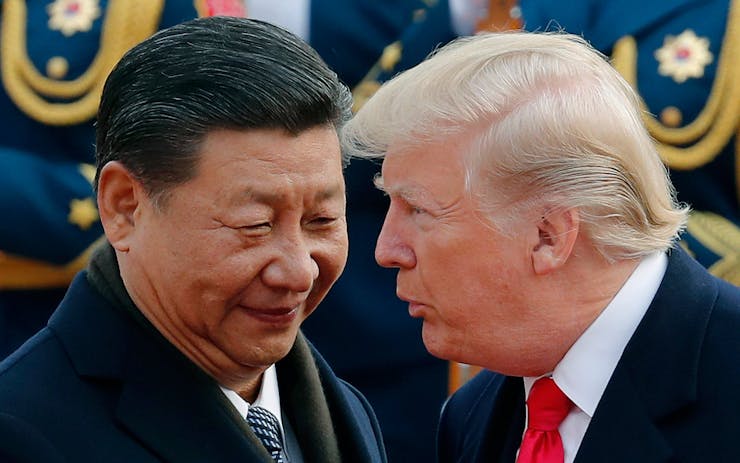That vape pen or jar of cannabis flower you hold in your hand might seem far removed from the world of international trade, but both come preloaded with President Trump’s new tariffs on Chinese-made goods.
The new taxes are squeezing cannabis companies, and consumers may feel the hit as well.
Trump’s trade war with China has hit the cannabis industry, which is now dealing with a 25% increase in the costs of the partly assembled consumer goods it imports from China.
$2 Cart Now $2.50
For example, in September 2018, a typical disposable vape cartridge manufactured in Shenzhen, China, cost US companies $2 wholesale. Under the first round of Trump tariffs, that went up to $2.20 per unit. The new 25% tariffs that kicked in on May 1 further increased the wholesale cost of each cartridge to $2.50.
An extra 50 cents may not seem like much, but it has a huge ripple effect.
An extra 50 cents might not seem like much, but “it has a ripple effect,” explained Peter Hackett, CEO of Air Vapor, a US vaporizer hardware distributor.
Let’s say you’re a high-volume vape cartridge importer. Multiply an extra 50 cents per unit by one million units, and you now have a $500,000 hole in your budget.
Hackett compared the tariffs to global warming, where a few degrees difference might not seem like much to a lay person, but it amounts of trillions of dollars in coastal property damage as polar ice melts and sea levels rise. “These tariffs just reverberate up and down the supply chain,” he said.
Trump’s Tariff Timeline
Trump has pursued a rebalancing of America’s trade relationship with China by ramping up import taxes first on industrial goods like aluminum, then on an expanding range of consumer goods.
First, partly assembled consumers goods, including vaporizer cartridges, glass jars with plastic lids, and preroll tins saw a 10% tariff added to their cost on Sept. 24, 2018. Then on May 1, 2019, after bilateral talks broke down, the Trump administration bumped that up to 25%.
Shop highly rated dispensaries near you
Showing you dispensaries nearThis summer, Trump is threatening to expand the 25% tariff to apply to $300 billion more in consumer goods, including items such as Nike sneakers.
The cannabis industry is already feeling the pain. “It’s already been hit,” said Hackett. “That third round [later this summer] won’t affect us much.”
Small Businesses Hit Hardest
Cannabis consumers aren’t likely to see an immediate jump in the price of Chinese-made products, Hackett said. Instead, he expects cannabis packaging importers and finished-goods manufacturers to attempt to absorb the cost through thinner margins, cost-cutting, or deficit spending.
What it means to consumers: lower-quality products at a higher price.
What that means to consumers: Trump’s China tariffs are leading to lower-quality products that carry a higher cost. That’s a hit that the biggest companies with the deepest pockets can afford to absorb. Smaller operations may have a tougher time of it.
“It really puts the squeeze on these manufacturers and producers, some of whom can take the squeeze while others can’t,” Hackett said.
One Company’s Story
That seems to be the case with Aster Farms, a two-year-old Lake County, CA, company of eight people that grows, manufactures, and distributes cannabis to 35 retail stores.
'We don’t have extra money sitting around to get hit with a 25% tax out of nowhere.'
Company president Sam Ludwig sourced especially pretty tins for Aster Farms’ prerolls. “The quality was better than domestic,” he said.
Aster Farms’ tins were already designed, produced, and about to ship when Trump’s tariffs hit. The change led to a two-month hold on the order, with costs going up 25%.
The cost blew a fresh hole in Aster Farms’ budget, already shredded by heavy regulations and taxes, said CEO Julia Jacobson.
“With all the permitting costs and everything that goes into being legal and licensed and getting on shelves in stores, we don’t have that extra money sitting around to get hit with a 25% tax out of nowhere,” she said.
It’s Not Just Boeing and Apple
Trade wars may sound like the kind of issues that only huge companies like Apple or Boeing have to deal with. “We were so head-down in this,” Jacobson said. “We never expected this to hit in our backyard.”
“It’s a direct casualty of this trade war,” said Hackett. “It kinks the supply chain and ends up squeezing the little guy really, really hard.”
Aster Farms competes with well-funded brands that plan to lose money for years while gaining shelf space.
“Then there are brands like us that don’t want to pass the price on to consumers, but our margins are shrinking and shrinking, and our bottom line does matter,” Jacobson said.
Trump: Pain Now, Gain Later
Trump has said that fairer trade with China requires some near-term economic pain, but Jacobson disagrees.
“This is not worth it,” she said. “This is not the right way to go about it.”
Trump may talk trade with China’s now-permanent ruler Xi Jinping on the sidelines of the G20 Summit, set for June 28.
Until then, “we just sit, wait, and suffer,” said Hackett.





